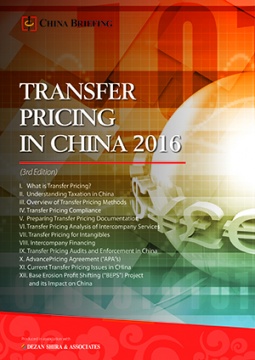Hong Kong’s Advance Pricing Arrangement Program
By Sowmya Varadharajan, IC Advisors Pte Ltd
When combined with aggressive tax planning, Hong Kong’s onshore-offshore tax regime often results in a reduced tax burden for taxpayers that operate through Hong Kong companies by pricing intra-group transactions. This has led to heightened transfer pricing scrutiny from the Hong Kong Inland Revenue Department in recent years.
In order to provide clarity to taxpayers operating in Hong Kong on the appropriate manner in which intragroup transactions should be priced, the Inland Revenue Department released its transfer pricing guidelines in 2009. This was followed by the introduction of the Advance Pricing Arrangement (APA) program in 2012.
The introduction of the APA programme is a welcome development for multinational companies, as it lays out the procedures for enterprises to ascertain the acceptability of their transfer prices with the Hong Kong and foreign tax authorities.
Negotiating an APA with the Hong Kong Tax Authorities
An APA is an agreement that determines an appropriate set of criteria (e.g. transfer pricing method, external data, appropriate adjustments, critical assumptions as to future events) to determine the pricing of related party transactions over a fixed period of time. This is either three or five years.
The APA is concluded under the Commissioner’s power of general administration under the Inland Revenue Ordinance, including the Double Tax Avoidance Agreements (DTAs) which form a part of Hong Kong’s tax legislation.
![]() RELATED: U.S.-HK Tax Agreement a Step Forward for Int’l Tax Cooperation
RELATED: U.S.-HK Tax Agreement a Step Forward for Int’l Tax Cooperation
Due to resource constraints, the Hong Kong Inland Revenue Department only accepts bilateral and multilateral APAs, rather than a unilateral APA. A unilateral APA is an agreement that is negotiated solely between the Hong Kong taxpayer and the Hong Kong Commissioner. The bilateral or multilateral APA, on the other hand, is an arrangement that not only involves the Commissioner in Hong Kong but also the relevant tax authorities in foreign jurisdictions that have signed a DTA with Hong Kong.
Hong Kong can only start an APA program with another country after having signed a DTA with that country. This is because the APA program is considered a process to resolve issues in applying the DTA.
Thresholds have been provided by the Inland Revenue Department on the materiality for an APA application. In other words, if the Hong Kong taxpayer does not meet these thresholds, the Inland Revenue Department will consider that the transfer pricing risk is not significant enough to be mitigated through an APA.
The APA process is most suitable for complex controlled transactions with high transfer pricing risk. Examples of this include cases where there are few comparable transactions, a significant amount of tax is involved or a significant amount of profit is moved out of Hong Kong. To this end, the following thresholds have been provided under the APA regime:
- Sale or purchase of goods: HK$ 80 million for each year covered under the APA
- Provision or receipt of services: HK$ 40 million per year
- Transactions involving intangible property: HK$ 20 million per year
The Inland Revenue Department’s APA process is broadly consistent with the processes adopted by other jurisdictions. They generally consist of the following five steps:
- Pre-filing
- Formal application
- Analysis and evaluation
- Negotiation and agreement
- Execution and monitoring
Recent APAs Concluded
Although the APA regime was introduced in 2012, it reached a milestone when Hong Kong concluded its first bilateral APA with the Netherlands in September 2014. This bilateral APA application was formally lodged with both the Hong Kong and Dutch tax authorities in September 2013 and was accepted into the APA program by the respective tax authorities in October 2013. The agreement was actually concluded within nine months, as compared to the 18 – 24 months that the Hong Kong tax authorities had estimated for concluding bilateral APAs. The timely manner in which this APA was negotiated and concluded can be explained by the following factors:
- Robust transfer pricing analysis
- Provision of detailed information requested by both parties
- Cordial relations between the Dutch and Hong Kong tax authorities
Hong Kong’s second APA, which was with Japan, was concluded in January 2015, just 4 months after the conclusion of the first APA. The successive conclusion of bilateral APAs is a testament of the Internal Revenue Department’s commitment to the APA program.
![]() RELATED: Understanding China’s Double Tax Agreements
RELATED: Understanding China’s Double Tax Agreements
The Internal Revenue Department currently has two dedicated officials leading the APA program. In addition, the APA team works with tax auditors who review the APA applications and information from a domestic perspective and ensure that the proposed transfer pricing methodology and margins are consistent with the expectations of the Internal Revenue Department from a domestic Hong Kong perspective. These recommendations are passed onto the APA team for its negotiations with the foreign tax authority.
Our Observations
Hong Kong is a key trading partner for several countries. Its top five trading partners are China, the U.S., Japan, Taiwan and India. As the APA program was introduced, one expected that a bilateral APA would be concluded first and foremost with China. The recent conclusion of the bilateral APA with Japan shows that Hong Kong trading partners are looking at APAs as an effective way to mitigate transfer pricing risks that may exist in their operations.
In addition, because the substantial tax difference that exists between Hong Kong and its top three trading partners China, the U.S. and Japan, the conclusion of bilateral APAs in a favorable manner may also result in reduced effective tax rates.
Given that the existence of the DTA is a precursor to the application for a bilateral APA, Hong Kong has been expanding its DTA network. China’s Special Administrative Region has to date signed 32 comprehensive DTAs with other countries. In addition, Hong Kong is in the process of negotiating 13 comprehensive DTAs with other countries such as Germany, India and Russia. The substantial increase in the number of DTAs will provide increased opportunities for multinational companies to apply for bilateral or multilateral APAs for related party transactions between its companies in Hong Kong and other countries.
The initiatives of the Organization for Economic Co-operation and Development (OECD) on base erosion and profit shifting place strong emphasis on rewarding each entity in the group for their business operations. With the increased scrutiny that taxpayers are facing from tax authorities on all aspects of taxation, the APA offers a non-adversarial approach in which taxpayers can engage with tax authorities in a transparent manner to achieve an optimal tax outcome.
Sowmya Varadharajan is a founding director of IC Advisors Pte Ltd, a transfer pricing consulting firm. Sowmya has more than 12 years of experience assisting clients in designing, supporting and defending various related party transaction structures. Having been trained in the U.S., Sowmya currently focuses her attention on helping clients in the Asia Pacific region address their transfer pricing issues.
|
Asia Briefing Ltd. is a subsidiary of Dezan Shira & Associates. Dezan Shira is a specialist foreign direct investment practice, providing corporate establishment, business advisory, tax advisory and compliance, accounting, payroll, due diligence and financial review services to multinationals investing in China, Hong Kong, India, Vietnam, Singapore and the rest of ASEAN. For further information, please email china@dezshira.com or visit www.dezshira.com. Stay up to date with the latest business and investment trends in Asia by subscribing to our complimentary update service featuring news, commentary and regulatory insight. |
![]()
 Transfer Pricing in China 2016
Transfer Pricing in China 2016
Transfer Pricing in China 2016, written by Sowmya Varadharajan in collaboration with Dezan Shira & Associates and Asia Briefing, explains how transfer pricing functions in China. It examines the various transfer pricing methods that are available to foreign companies operating in the country, highlights key compliance issues, and details transfer pricing problems that arise from intercompany services, intercompany royalties and intercompany financing.
 Annual Audit and Compliance in China 2016
Annual Audit and Compliance in China 2016
In this issue of China Briefing, we provide a comprehensive analysis of the various annual compliance procedures that foreign invested enterprises in China will have to follow, including wholly-foreign owned enterprises, joint ventures, foreign-invested commercial enterprises, and representative offices. We include a step-by-step guide to these procedures, list out the annual compliance timeline, detail the latest changes to China’s standards, and finally explain why China’s audit should be started as early as possible.
Managing Your Accounting and Bookkeeping in China
In this issue of China Briefing, we discuss the difference between the International Financial Reporting Standards, and the accounting standards mandated by China’s Ministry of Finance. We also pay special attention to the role of foreign currency in accounting, both in remitting funds, and conversion. In an interview with Jenny Liao, Dezan Shira & Associates’ Senior Manager of Corporate Accounting Services in Shanghai, we outline some of the pros and cons of outsourcing one’s accounting function.
- Previous Article Das Verfahren zur Jährlichen Compliance in China Teil 2
- Next Article Tax Holes in China – From Trading To Manufacturing










